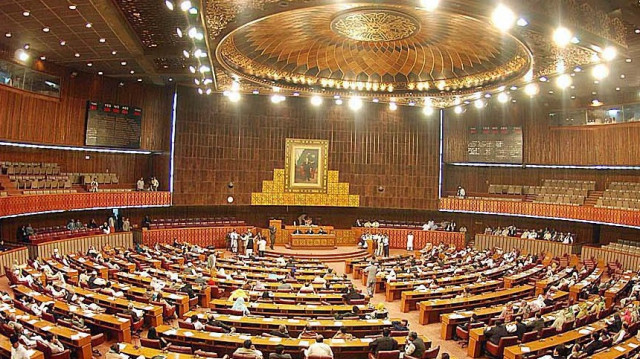In unison: Parliament passes foreign policy reboot
New guidelines demand end to drone strikes, bar use of routes for transporting arms.

In unison: Parliament passes foreign policy reboot
In a move set to go down in history, a joint session of parliament on Thursday unanimously approved new recommendations on relations with the United States.
The new recommendations of the Parliamentary Committee on the National Security (PCNS) passed by the sitting, include a host of new demands such as an immediate end to US drone strikes and prohibiting the use of Pakistani airspace for transportation of arms
and ammunition to Afghanistan.
However, most notably, the recommendations stopped short of deciding the fate of suspended Nato supplies – leaving the burden of the decision solely on the shoulders of the executive/government, which will now have to absorb the fallout by itself.
The joint sitting of the National Assembly and Senate called upon the government to ensure the immediate cessation of drone attacks inside the country’s tribal regions and infiltration into Pakistani territory on any pretext, including hot pursuit.
In its redrafted proposals, the PCNS accommodated most demands made by opposition parties including Pakistan Muslim League-Nawaz (PML-N) and Jamiat Ulema-e-Islam-Fazl (JUI-F) to achieve what turned out to be a hard-earned consensus.
Not surprisingly, since the opposition wanted to pass up taking any ownership on the decision for Nato supply routes, the opposition demanded that the government not use parliament for such a decision and instead issue an administrative order if it wanted to do so.
It took the 13-member bipartisan, bicameral committee headed by Pakistan Peoples Party (PPP) stalwart Senator Raza Rabbani more than three weeks to prepare revised recommendations after the previous draft was rejected by the PML-N and JUI-F last month.
“We want to proactively engage with our international partners. Our resolve to combat extremism and terrorism remains unshakeable,” Rabbani told parliament.
Though the PCNS had asked the ministry of defence and the Pakistan Air Force (PAF) to formulate new flying rules for the areas close to Afghan border, it stopped short of suggesting the shooting down of drones or intruding gunships.
Prime Minister Yousaf Raza Gilani told parliament his government would implement the recommendations in “letter and spirit.”
“Our partnership cannot be at the cost of our sovereignty or territorial integrity,” he said.
The premier went on to say that democracy in Pakistan had crossed yet another milestone with parliamentary oversight of foreign and security policy which had remained the exclusive domain of the establishment in the past.
The premier said US President Barack Obama had assured him at a recent meeting in South Korea that Washington would respect the outcome of Pakistan’s parliamentary review and country’s sovereignty.
“The US president has given us a commitment and he knows the meaning of sovereignty,” the premier added.
And even though the government did not explicitly comment on the suspended Nato routes, the premier dropped a hint regarding the government’s intention to reopen supply routes for US-led coalition forces in Afghanistan.
“We suspended supplies and boycotted the Bonn conference when all this was needed but we think the time has come to re-engage ourselves with dignity and with self respect,” Prime Minister Gilani added.
Earlier, Opposition Leader in the National Assembly Chaudhry Nisar Ali Khan sought assurances from the government on the implementation of new recommendations.
“I will ask the prime minister to tell us what his government will do if drone attacks continue and Pakistani territorial sovereignty is violated even after the approval of these recommendations,” said Khan, whose party (PML-N) had earlier advised the government to seek firm guarantees from the US to respect the parliamentary process.
JUI-F chief Maulana Fazlur Rehman, whose party ended its boycott of the PCNS on Wednesday, said Pakistan had set itself on a new path by adopting new guidelines, adding that the government must tread this path carefully to avoid sabotaging the ‘national unity’ achieved with the collective wisdom of the country’s political leadership.
Apology
The recommendations also included the earlier call for an unconditional apology for Nato air strikes in November that killed 24 Pakistani soldiers in Mohmand Agency. The committee also called for punishment for officials who allegedly perpetrated the attack.
The panel recommended that all verbal agreements of the past under which Pakistan and the US were cooperating in the war on terror be scrapped immediately and suggested parliamentary approval for new deals between the two countries, as opposed to putting all previous deals on paper.
The committee also made it binding on the government to expel all the foreign intelligence operatives and security contractors from the country, as opposed to the initial recommendation of making them subject to Pakistani law.
It also encouraged the government to pursue projects such as gas pipelines from Iran, but added the name of Turkmenistan to ostensibly pacify US concerns.
Major changes between previous and adopted recommendations
New recommendations
1 Pakistani territory including its airspace shall not be used for transportation for arms and ammunition to Afghanistan
2 All verbal agreements or understandings regarding national security shall cease to have effect forthwith
3 No security contractors or intelligence operatives shall be allowed
4 Pakistan should actively pursue the gas pipeline projects with Iran and Turkmenistan
Discarded recommendations
1 The activity of foreign private security contractors must be transparent and subject to Pakistani law
2 Any use of Pakistani bases or foreign forces would require parliamentary approval
3 Reopening of Nato supply routes must be contingent upon thorough revision of terms and conditions of the agreement
4 Any verbal agreement that exists should be converted into written immediately, failing which it shall cease to have effect within three months of approval of these recommendations
5 Government of Pakistan should revisit MoUs between Ministry of Defence and United Kingdom dated June 19, 2002
6 New terms and conditions for Acquisition and Cross-Servicing agreement dated: February 09, 2002 between USA and Pakistan may be renegotiated
7 New transit facility/agreement should be immediately suspended in case of violation of Pakistan teritorial integrity by US/Nato/Isaf forces
8 There should be prior permission on number and presence of foreign intelligence operatives in Pakistan
9 Fifty per cent (50%) of US/Nato containers may be handled through Pakistan Railways
10 Pakistan should actively pursue gas pipeline project with Iran.
(Read: Resetting US-Pakistan ties)
Published in The Express Tribune, April 13th, 2012.


















COMMENTS
Comments are moderated and generally will be posted if they are on-topic and not abusive.
For more information, please see our Comments FAQ